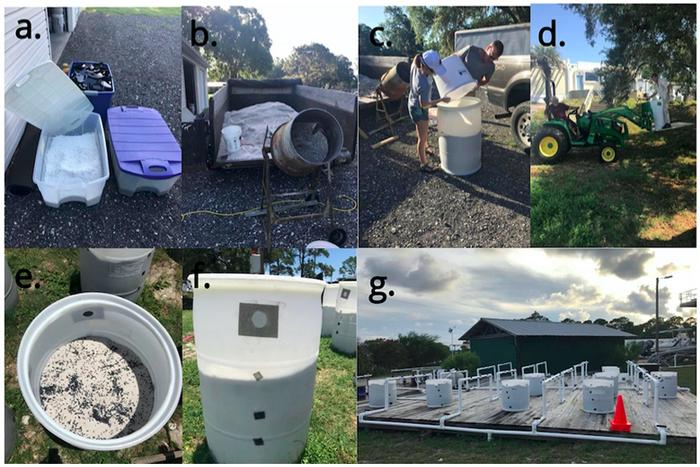New research from Florida State University published in Frontiers in Marine Science found that extreme concentrations of microplastics could increase the temperature of beach sand enough to threaten the development of incubating sea turtles.

Credit: Courtesy of Mariana Fuentes
New research from Florida State University published in Frontiers in Marine Science found that extreme concentrations of microplastics could increase the temperature of beach sand enough to threaten the development of incubating sea turtles.
Sea turtles play a vital role in the marine ecosystem, and for these oceangoing reptiles to thrive, they need healthy beaches where their eggs can incubate successfully.
“Sea turtle sex, fitness and hatchling success is influenced by temperature,” said lead author Mariana Fuentes, an associate professor in FSU’s Department of Earth, Ocean and Atmospheric Science. “Not much is known on how the presence of microplastic affects the thermal profile of sand. Understanding how changes to the environment could affect the temperature of nesting grounds is important for monitoring the future of these keystone species.”
Researchers mixed sand from beaches at the FSU Coastal and Marine Laboratory with black and white microplastic. Concentrations of microplastic ranged from 5% to 30% of the total volume of the sediment sample. Then they recorded temperatures from July through September 2018 by burying digital thermometers at the same depth at which loggerhead sea turtles typically lay their eggs.
They found that samples with higher microplastic concentrations had greater increases in temperature, with the sample containing 30% black microplastic pieces having the highest mean difference in temperature. Those samples were 0.58 degrees Celsius warmer than the control group, an increase that could potentially significantly alter sea turtle hatchling sex ratios, physiological performance, and mortality of embryos.
The good news from the study is that the 30% concentration of microplastics in those samples equates to about 9.8 million pieces per cubic meter, a higher concentration than has been currently found on beaches worldwide. Current research has found the highest reported concentrations collected from beaches is about 1.8 million pieces per cubic meter.
But the amount of microplastics at nesting sites has only recently been explored. It could be higher in locations that haven’t been studied yet, and demand for plastic is forecast to increase in the future.
At nesting grounds where incubating eggs are near a 29-degree Celsius boundary — below which most hatchlings are male, and above which most hatchlings are female — smaller concentrations of plastic could be enough to push the temperature beyond a crucial threshold.
“Sea turtle eggs are sensitive to temperature, and microplastics are another factor adding to the heat they face,” Fuentes said. “This study gives us a baseline for future research on how they are affecting the nesting environment.”
The research was supported by FSU’s Garnet and Gold Scholar Society. Researchers with the University of Florida and the University of North Carolina Wilmington were co-authors on this study.
Journal
Frontiers in Marine Science
DOI
10.3389/fmars.2023.1146556
Article Title
The effects of microplastic on the thermal profile of sand: implications for marine turtle nesting grounds
Article Publication Date
29-May-2023
COI Statement
The authors declare that the research was conducted in the absence of any commercial or financial relationships that could be construed as a potential conflict of interest.




